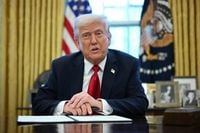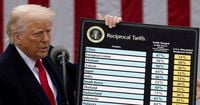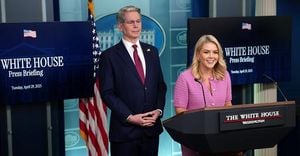As President Donald Trump reaches the milestone of 100 days in office on April 29, 2025, his administration has been marked by a whirlwind of activity aimed at fulfilling his ambitious promises. With a Republican-controlled Congress backing him, Trump has begun to reshape the federal government and foreign policy in ways that have left many observers questioning both the short- and long-term impacts of his actions.
On his first day in office, Trump declared an energy emergency to boost production in the sector, with a promise to significantly reduce utility bills by 2026. However, his administration's approach to economic policy has been met with mixed results. Inflation, which peaked at 9.1% in 2022, has seen a decline to 3% in January 2025 and further down to 2.4% in March 2025. Trump has boldly claimed, "We already solved inflation," though the Federal Reserve has warned that his proposed tariffs on foreign goods could lead to higher prices, potentially undermining his goal of lowering the cost of living.
One of Trump's notable achievements has been in immigration control. The number of illegal crossings from Mexico dropped dramatically from 249,740 in December 2023 to just 7,181 in March 2025. This sharp decline indicates that his administration is making strides in fulfilling its promise to secure the southern border. However, concerns remain over the due process rights of deported individuals, exemplified by the case of Kilmar Abrego Garcia, who was sent back to El Salvador without a hearing.
In the realm of energy, Trump has pledged to cut energy costs by half to three-quarters within 12 to 18 months. Yet, the feasibility of such a promise remains uncertain. During his campaign, he claimed, "Under my plan, we will cut energy and electricity prices in half," but the actual impact of his policies will not be measurable until the promised timeline elapses.
Trade has been another cornerstone of Trump's agenda. He has aggressively imposed tariffs on foreign imports, particularly from China, where tariffs have reached as high as 145%. The administration's trade war has escalated tensions, with China retaliating with its own tariffs of 125% on U.S. goods. This ongoing conflict has raised alarms about the potential for a trade embargo between the two largest economies in the world, which analysts warn could disrupt global trade and lead to supply chain shocks in the United States.
Trump's foreign policy has also been characterized by a dramatic shift. His approach has strained long-standing alliances and altered the U.S.'s role on the global stage. Critics have pointed out that the U.S. is now seen as an "unpredictable ally," with Trump cutting aid to Ukraine and failing to deliver on his promise to broker peace in the ongoing conflict with Russia. Despite his claims that he would settle the war quickly, the situation remains unresolved, and Trump has faced backlash for his inconsistent messaging regarding Ukrainian President Volodymyr Zelenskyy and Russian President Vladimir Putin.
In a recent Oval Office discussion, Trump expressed frustration over the lack of progress in negotiations, swinging from labeling Zelenskyy a "dictator" to condemning Putin for continued aggression. The chaotic nature of his foreign policy has led to criticism from former officials, who warn that the lack of clarity and direction could have dire consequences for U.S. national security.
Domestically, Trump has also taken aim at educational institutions, threatening to withdraw funding from universities that do not comply with his administration's directives on diversity and inclusion programs. His administration has already frozen over $2 billion in grants, targeting institutions like Harvard that have resisted his demands.
Trump's agenda has not been without controversy. His administration's efforts to roll back rights for transgender individuals in sports and military service have sparked significant backlash, and his administration has faced lawsuits over various executive orders. Critics argue that many of his initiatives are not justifiably grounded in law, raising questions about their long-term viability.
Moreover, Trump's relationship with tech companies has come under scrutiny. Amazon recently faced criticism for considering displaying import charges on its products due to the tariffs. The White House publicly criticized the reports, highlighting the tension between the administration's trade policies and the operational realities of major retailers.
As Trump continues to push his agenda, the implications of his policies are becoming increasingly evident. The U.S. trade deficit reached a staggering $918.4 billion in 2024, with goods deficits hitting a record $1.2 trillion. Many economists are concerned that Trump's protectionist measures may ultimately harm American consumers and businesses by raising prices and limiting access to foreign markets.
In summary, President Trump's first 100 days have been a period of significant upheaval, characterized by sweeping changes in both domestic and foreign policy. While he has made strides in some areas, such as immigration and trade, the long-term consequences of his actions remain uncertain. As the administration moves forward, the challenge will be balancing the ambitious promises made during his campaign with the practical realities of governance in a complex global landscape.





